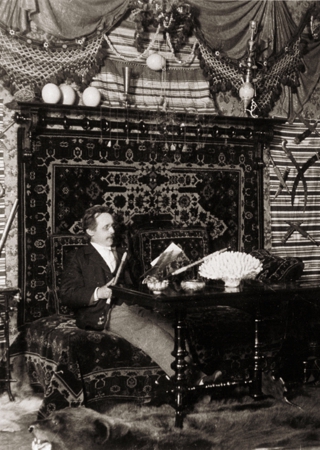
Karl May – Biography
(1842–1912)Translated by Dr. William E. Thomas
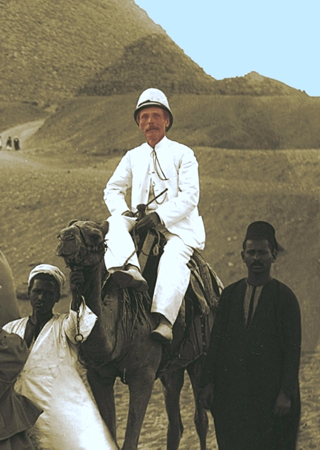

|
Karl May – Biography(1842–1912)Translated by Dr. William E. Thomas |
 |
| Year | Life Events | Residence |
| 1842 | Carl May
was born on Friday the 25th February 1842 at 10 PM, and baptized the
next day at the Evangelic-Lutheran Church of St.Trinity [St.
Trinitatis] in Ernstthal. The Godparents were master weaver Carl
Gottlob Planer (1792–1859), Miss Chr. Friederike Esche (dates of
birth and death unknown), and the apprentice smith Christian
Friedrich Weissflog (1819–1894). He is the fifth child of the 32
years old weaver Heinrich August May and his 27 years old wife
Christiane Wilhelmine, born Weise. There was a big misery in the
household of the May's family - bitter poverty, many a time even
hunger. From his four sisters born only the four-year old Auguste
Wilhelmine was still alive.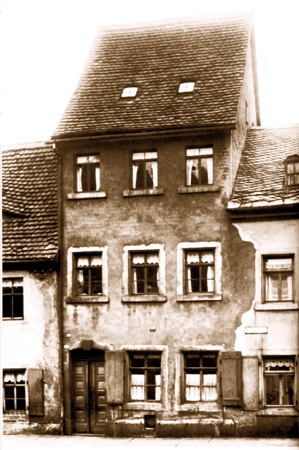 In this year there »was a very dry and hot summer. From the sowing time on there was no rain for six to seven weeks and almost the whole summer the weather brought no rain. General shortage of water appeared so that much of the grain could not be ground and consequently was only cut. ... Live stock suffered extremely and most cattle became emaciated and weak and had to be slaughtered. …« |
Ernstthal, Niedergasse 122 (Karl-May-Haus) |
| 1843 | Because
of »lack of suitable cattle for slaughter [a] high price of the
meat« came about. The situation of the ›Weaver's misery‹ could be compared with the state of affairs at present in the developing countries – ideal conditions for diseases caused by lack of vitamins and infections; this will also be Karl May's fate. |
Ernstthal, Niedergasse 122 |
| 1844 | 28th
May: Karl May's sister Christiane Wilhelmine was born, the later
Mrs. Schöne. In Hohenstein and Ernstthal great hunger is still
present: »Yes there in fact happened recently cases here, that people, who were ashamed to beg, literally died from hunger. Because it is not so rare, particularly in families with many children, that often for many days there is not even a piece of bread to consume and a few potatoes cooked in jacket and eaten with salt often represent the only nourishment of these unfortunates. But in quite many families the potatoes are also gone, or are running short, and then is the full suffering from hunger and begging unavoidable … It is indeed heartbreaking, to observe these pityful unfortunates with pale and gaunt faces, with troubled deep sunk eyes, from which every spark of liveliness is extinguished, … to drag themselves like shadows, …« Lack of vitamin A was the most likely cause of Karl May's disturbed vision – (blindness in diminished light condition, hemeralopia). From now on he was heavily visually handicapped – the beginning of Xerophthalmia threatened his eyesight. |
Ernstthal, Niedergasse 122 |
| 1845 | Karl
May's condition got worse: his eye lids are closed and swollen
(Blepharitis), an inflammatory Blepharospasm follows. He could not
open his eyes for prolonged periods of time. He is therefore blind
and forgets to see. He could not remember later his previous visual
impressions. Good doctors are out of reach financially, there was
not yet any public health insurance in existence. May complains in
his autobiography Mein Leben und Streben [My Life and
Aspirations] about the »ruinous quackery« to which he fell a victim.
Most probably were his closed eye lids quite ineffectively treated
with ointments and eye bandages: the so far small chance to see even
though for a short time, was in this way fully undone. I could easily feel people and objects, to hear, also to smell; however that was not enough to imagine them in reality and form. I could have only guessed. How a person, a dog, a table looked, I did not know; I could have only made a picture in the inside of them, and such picture remained in my mind. When someone spoke I heard not his body but his soul. Not his outside but his inside came closer to me. Karl was in constant care of his grandmother Johanne Christiane May, the mother of his father. She left a deep impression on his way of thinking and the sensual world of the boy with her fairy tales romantic. The following months became the source of May's very rich phantasy. Moving into the house of a weaver Carl August Knobloch. On the 15th August starts a six months midwifery course for May's mother. |
Ernstthal, Marktplatz 183 |
| 1846 | 13th
February: May's mother sat for examinations in midwifery at the
Surgical-Medical Academy (Kurländer Palais) in Dresden with an
»excellent pass«. The eyes of her blind boy were also succesfully
attended there by Professors Haase and Grenser – Karl May learned to
see. (Oil painting by Torsten Hermann).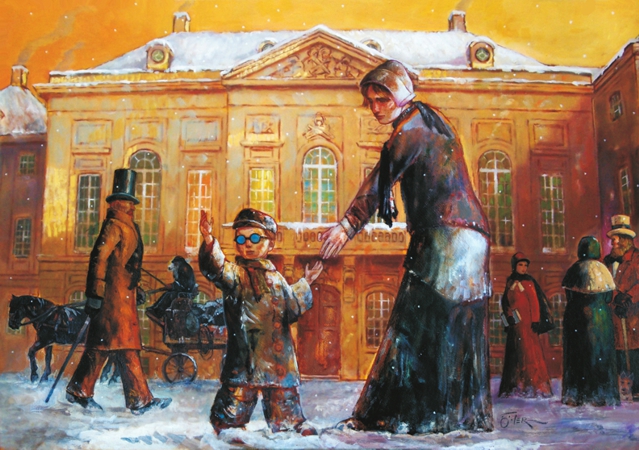
For me there were only souls, nothing but souls. And so it stayed, even after I learned to see, from my youth on until the present day. This is the difference between myself and the others. This is the key to my books. This is the explanation to all, what is praiseworthy on me, and to all what is to blame in me. Only who was blind and who regained his sight again, and only who possesses such a deep founded and such a mighty inner world that he himself afterwards, when he could see again and for the rest of his life masters his whole external world, only he can identify with all what I planned, what I have done and what I wrote, and only he has the ability to critise me, and noone else! Latest research points to it that in Dresden also the rickets, caused through lack of vitamin D, were treated succesfully. In regard to this May writes in his autobiography: I learned to see and returned, as for the rest recovered as well, home. On the 19th March May's mother was engaged as a midwife by the Ernstthal council. |
Ernstthal, Marktplatz 183 |
| 1847 | Karl
May was torn away from the world of fairy tales of his grandmother.
The rough education methods of his father shook May's psyche as from
now: On the weaver's stool hung a three times twisted rope, which was leaving blue marks, and behind the oven was the well-known »Johny-the birch«, especially feared by us children, because father was fond of soaking it before thrashing us in a big pot with warm water, to make it more elastic and painful. 2nd June: His sister Ernestine Pauline was born.. |
Ernstthal, Marktplatz 183 |
| 1848 | Easter:
Karl May entered school. The classes in the Ernstthal primary school
are overcrowded; one teacher had approximately 90 pupils to teach.
What Karl did not learn there, his father hammered into him. The boy
should have it better in life. In such way Karl was forced in the
following years to read innumerable, partly scientific books,
ordered by his father. The spare free time Karl spent with his
godfather, the widely travelled master smith Christian Weißpflog,
listening to his exotic tales. |
Ernstthal, Marktplatz 183 |
| 1849 | Karl May
became a drummer boy with the 7th Militia company of Ernstthal, in
which his father served as lance-corporal. His father exercised and
drilled him in various war games. 9th June: May's sister Karoline Wilhelmine was born, the later Mrs. Selbmann. |
Ernstthal, Marktplatz 183 |
| 1850 | Ferry's
›Le Coureur des Bois‹ [Der Waldläufer] is published, which May
twenty-nine years later reworked for young readers. |
Ernstthal, Marktplatz 183 |
| 1851 | Presumably
in this year: moving into the house of master weaver Selbmann. Puppet theater in Ernstthal: Now came the day in which a world open to me, that never let me go loose again. The theater arrived. Even if only a quite ordinary, miserable puppet show, but nevertheless a theater. They performed in master weaver's house. The best places were three pennies, than two pennies, and the next one penny, children paid half. I was allowed to attend with my grandmother. This cost us fifteen Pfennigs for both of us. They performed: »The Miller's Rose or the Battle at Jena.« My eyes burned; I was glowing inside. Puppets, puppets, puppets! However for me they were alive. [My Life and Aspirations, p.55.] 7th April: Birth of a brother Heinrich Wilhelm; he died already a few months later on the 20th September. On the 30th November died Christiane Friederike Weise, May's grandmother on mother's side, 64 years old. |
Ernstthal, Marktplatz 185 |
| 1852 | 16th
August: May's sister Anna Henriette was born; she also died much too
soon, a few weeks old, on the 4th September. |
Ernstthal, Marktplatz 185 |
| 1853 | The
aggravating education mistake started by May's father, to hammer the
›knowledge‹ into his son, may have in this year reached the first
high point. Karl May writes in the so appropriately named chapter
Without Youth in his autobiography: He brought all possible so called learning material together, without being able to make a choice or to set an orderly line to follow. He brought everything my way what he found. I had to read this or even to copy it, because he thought that in such way I could remember it better. What had I to go all through! Old prayer books, arithmetic books, biology writings, scientific treatises from which I did not understand one word. A German geography from the year 1802, over 500 pages thick, I had to transcribe in order to remember better the data. They of course were no longer valid! I sat whole days and half the nights long, to cram these useless, unnecessary stuff into my head. It was an overload and excessive load unparalleled. [My Life and Aspirations, p.53] |
Ernstthal, Marktplatz 185 |
| 1854 | Karl May
is getting privately language tutoring, which he must finance
himself. Twelve years old by now, he has to work as a skittle boy in
the neighbouring Hohenstein in a pub Engelhardt – sometimes until
midnight! There he hit upon the lending library: ›Rinaldo Rinaldini,
the Chief of Robbers‹ – ›Himlo Himlini, the Chief of Robbers in
Spain …‹ – ›Sallo Salini, the Most Formidable Chief of Robbers …‹,
are the names of his heroes who became his imaginary idols. 5th May: Birth of his brother Karl Hermann, who dies already on the 15th August. |
Ernstthal, Marktplatz 185 |
| 1855 |
3rd July: May's brother Karl Heinrich was born; this child also dies after a short time on the 30th October. |
Ernstthal, Marktplatz 185 |
| 1856 | Flight
from reality! The book, which I read, had the title »The Robber's Den in Sierra Morena or the Angel of All the Outcasts«. When father came home and then went to sleep, I got out of bed, sneaked away from the room and got dressed. Then I wrote a note: »You don't have to work out your hands until they bleed; I am going to Spain, I bring help!« I put this note on the table, stuck a piece of dry bread into my pocket with a few pennies from my skittle job, went down the steps, opened the door, took once more a deep and sobbed breath, but quietly, quietly, so that noone could hear, and went then with subdued steps down the market place and the Niedergasse out, the Lungwitzer way, which led over Lichtenstein to Zwickau, towards Spain, into Spain, the land of noble robbers, who helped those in need. – – – [My Life and Aspirations, p.79] Karl did not go far, his worried father brought him home. I have never felt more clearly as then, how he really loved me. [p.93] Palm Sunday, the 16th March: Karl May was confirmed. Michaelis. 29th September: He became a Proseminarist at the Teacher's Institute in Waldenburg. The lessons were cold, strong, hard. Any trace of poetry was missing. Instead of making one happy, to inspire, it repeled. The lessons in religion were such that one could not have become enthusiastic about them in the least. [p.95] On the 22nd November Emma Lina Pollmer was born, May's first wife, in Hohenstein; her mother died on the 4th December because of puerperal sepsis. |
Ernstthal, Marktplatz 185 Waldenburg |
| 1857 | Karl
May fell in love with the fifteen year old Anna Preßler from
Ernstthal. He composed words and wrote music for a love song, which
he played for her on a guitar: Away from you,
I am with you And wherever you are, You are with me. To let go off you, this I can not do, 'cause you are my everything, you are the light of my life! 21st November: May's sister Maria Lina was born; she died on the 13th December. |
Waldenburg |
| 1858 | In July
the sixteen year old Anna Preßler marries a shopkeeper Carl Hermann
Zacharias, by whom she expects a child. The grief stays deep in Karl
May, he will never get over it. May writes his first Indian story and sends it to the ›Gartenlaube‹ magazine. Ernst Keil, the editor, rejects the – today lost – early work. |
Waldenburg |
| 1859 | In
November May is on duty responsible for lightings at the Teacher's
Institute in Waldenburg. At this opportunity he embezzles six
candles, which he intends to use for a X-mas tree in the wretched
parent's house. On the 21st and 22nd December this affair is
investigated by the director of the Institute, Schütze. |
Waldenburg |
| 1860 | 28th
January: Expelled from the Teacher's Institute. 4th March: May's sister Emma Maria is born;she died on the 5th August. 6th March: Supported by Ernstthal parish priest Schmidt, May submits a plea for mercy to the Saxonian Ministry of Education. The director of the Institute Schuetze, who in the meantime regrets his harshness, supplies a positive recommendation. 4th June: May is allowed to continue with his education at the Teacher's Institute in Plauen. There he suffers, as many of his school mates do, from the spying system of the school directors; they are interested in the intimate sexual life of the students. |
Ernstthal, Marktplatz 185 Plauen |
| 1861 | 9th,10th.
and 12th September: May completed his final examinations. 13th September: His leaving certificate had the final mark »passed«. May is active as a temporary teacher only from 7th October until 19th October in Glauchau. It came to a jealousy scene with his room landlord Ernst Theodor Meinhold. The businessman surprised May, as he kissed his nineteen-year old wife Henriette, whom he was giving piano lessons. Meinhold reported this romance to the superintendent Carl Wilhelm Otto – Karl May was dismissed on the spot. 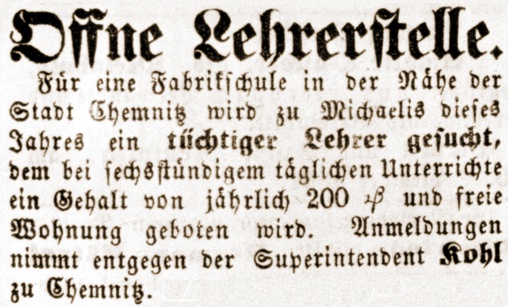 His next teacher's position became May's undoing. In Altchemnitz, where he worked from 6th November as a factory teacher at the Firma Solbrig, he had to share his living quarters, a room and a bedroom, with their book-keeper Julius Hermann Scheunpflug. He had until now both this to himself; and now I was to lodge with him … Because of that he lost his comfort … He got from his parents a new pocket watch. The old one, which he now no longer needed, hung unused on a nail on the wall. It was worth at the most twenty marks. He offered it to me to buy, because I had none; however I declined, because if I wanted to buy sometime a watch, it would have to be a new, better one. Of course this was far in the future, as I had to pay off first my debts. Now he himself made a proposal to me to take his old watch, when I go to school, as I was obliged to be punctual. I agreed and was thankful to him for that. At the beginning I hang the watch, as soon as I came back from school, immediately back on the nail. Later it was postponed for a while; I kept it for hours in my pocket, because to show all the time, that it does not belong to me, seemed to me not diligent, but ridiculous. In the end I took it even when I went out and hung it only in the evening, after I came home, in its place and position. A really friendly or even cordial relation never eventuated between us. He tolerated me because he had to and let me from time to time deliberately notice, that he does not like sharing the flat. [Life, p.103f.] The X-mas holiday started.On the 24th December May hurries directly from school to the railway station and travels home; he takes the watch with him. There he is arrested. He is supposed to have stolen the watch, a tobacco pipe and a cigaret holder from his flat mate. May is dismayed: I started foolishly to deny the possession of the watch; however it was found after a search. So the lie destroyed me instead of saving me; that she does every time; I was a – - – thief! [p.107] May's description is credible. Through the intrique of the book-keeper innocent in custody – professional career ruined! This event had an effect on me like a blow, like a blow on the head, under which force one breaks down. And I collapsed! [p.109] |
Plauen Glauchau Altchemnitz Ernstthal, Marktplatz 185 |
| 1862 | May was
most probably – the proceedings have not survived – sentenced
because of »unlawful use of someone else's possession« according to
Art. 330, Abs. 3, [German Law]. The highest punishment was imposed:
six weeks imprisonment. Clemency petition was refused. From the 8th September till the 20th October: Stay in prison at Chemnitz. According to the present interpretation of law May would not have been imprisoned. This fatal blow resulted in permanent ban on becoming a teacher. 6th December: May was called for military service examination and found »unfit for service«. |
Ernstthal, Marktplatz 185 |
| 1863 | May
performed at »music – poetic evening entertainments« in Ernstthal.
His living he made by private tutoring. On the 12th February he was
reported because of this to the teacher's college; the school
inspection found out about this through a letter of Ernstthaler's
priest Schmidt from 20st March. 20th June: May's name was removed from the list of the Saxonian teacher's candidates. To give private lessons was explicitly forbidden to him. His civilian existence was destined to fail. It was as if I had brought home from the prison cell in which I spent six long weeks, a whole crowd of invisible criminal characters, who made it their business to settle down with me and make me one of them. I did not see them; I saw only the darkest, sneering main figure from the domestic swamp and from Hohenstein's trash novels; they talked to me, they influenced me. And when I struggled against, they became louder to stun and wear me out, in order to loose my strength to resist. The main idea was for me to take revenge, revenge on the owner of the watch who reported me, only to get me out from his flat, revenge on the Police, revenge on the judge, revenge on the Government, on humankind,altogether on everyone! I was an exemplary person, white, pure and innocent like a lamb. The world cheated me out of my future, my life happiness. How? By remaining what they have made out of me, namely a criminal. This was what the tempters inside me asked me to do … I resisted as much as I could, as far as my strength lasted. I gave to all, what I wrote at that time, in particular to my village stories, an ethical, a strongly law abiding, a faithful-to-king tendency. I did that to prop up not only others,but also myself. But how hard, how endlessly hard it was for me! When I did not do as the loud voices inside me asked to do, I was overwhelmed from them by scornful laughter, by swearing and curses, lasting not only for hours, but for half days and whole nights long. I jumped from my bed, to escape these voices, and ran out into the rain and snowstorm. [Life, p.117f.] That May really suffered from considerable psychological disturbances, ran out at night in the rain, shows his from that time originating poem: Do you know the Night,
descending on Earth,
With hollow wind and heavy deluge; Thick Night, through which starshine is given no berth, No eyes see through the weather's dense wall? Even if this Night is gloom, in morning there is refuge; O lie down in rest and sleep without fear! Do you know the Night, descending on Life, When Death tracks you down in your last camp; The call of eternity sounding close by, And fear stops still your heart's pulsing call? Even if this Night is gloom, in morning there is a refuge; O lie down in rest and sleep without fear! Do you know the Night descending on your Mind, Which cries in vain, Salvation! Night's serpent slithers into memory And a thousand demons spit in your brain? O keep away in sleepless consternation, Because this is The Night that has no morning! At first May struggles succesfully against these »thousand devils«. He writes for the Ernstthal's choir ›Lyra‹ a whole series of his own musical pieces.. |
Ernstthal, Marktplatz 185 |
| 1864 | May is
registered to stay in Nausslitz near Dresden. Nothing is known about
this time. In the second half of the year he most probably trails a
theater group through Saxony and maintains as well amorous
relationship with a ballerina from the theater – and ballet group H.
Jerwitz from Leipzig. Nearly 21 months passed since May's six-week
detention in Chemnitz. Now he lost his composure: This night [in my soul] was not completely dark, it had twilight. And strangely it reached only the soul, but not the spirit. I was sick in my soul, but not in my mind. I had the capability to reach logical conclusions, to solve every mathematical problem. I had the most acute insight into all what was outside myself, but as soon as this came close, to enter into a relation, the understanding ceased. I was not in a position to look at myself, to understand myself, to guide myself and to manage. [Life, p.111] The »thousand devils« led Karl May on the 9th July to Penig. There he called himself »Dr. med. Heilig«, »Eye doctor« and »previously with the military« from Rochlitz. He had pieces of clothing made to measure and disappeared without paying. Before that he wrote a prescription in Latin for a young man with sore eyes. 16th December: In Chemnitz May emerges as »Seminary teacher Ferdinand Lohse« and rents in a hotel ›Zu goldener Anker‹ two interconnected rooms. There he had delivered various ladies furcoats. He takes them into the next room to a »sick Director« and disappears then with the furs. |
Naußlitz near Dresden |
| 1865 | 28th
February: In Gohlis May lives at a steelworker Schule. On the 20th
March he looks up, as »Coppersmith Hermes« the Godfather of thieves
and merchants, the furrier Friedrich Erler and relieves him from a
castor fur. A day later May pawns the fur with an unsuspecting
broker in Leihhaus. During an attempt to collect the proceeds May
was seized on the 26th March in Rosenthal, a park area between
Gohlis and Leipzig, when a hatchet »under his jacket was seen to
glitter.« At the office room he is »quite motionless and apparantly lifeloss and also, after the Police doctor was called in, he did not speak.« Such an apathy recorded on files makes one think! Some time passed until May reacted to talking to and confessed all. 8th June: Karl May was sentenced by district court in Leipzig »because of repeated frauds« to four years and one month in penitentiary. On the 14th June he was delivered to the prison ›Schloß Osterstein‹. May is now a prisoner »No. 171«. He was detailed to an office, failed however such duties because of psychological weakness. 19th September: May's fairy-tales-story grandmother dies 85 years old. |
Gohlis Zwickau, Schloss Osterstein |
| 1866 | May is
detailed to making money- and cigar wallets. |
Zwickau, Schloss Osterstein |
| 1867 | The
supervisor Friedrich Göhler discovers May's music talent. May
advances to trombone player and becomes a member of the prisoner's
church chorus. Presumably towards the end of the year he is named a
»special clerk« to the Inspector Kreil and transferred into an
isolation block. The voluminous prison's library changes his imprisonment
time into a study time. |
Zwickau, Schloss Osterstein |
| 1868 | Literary
draft appears: the Repertorium C. May. 2nd November: May is, because of good behaviour, »as the result of the very most clemency«, released from jail 253 days earlier than originally anticipated – with a certificate of trustworthiness. At home he finds out about the death of his fairy-tales-story grandmother. This news disturbes again his psychological equilibrium. The previous suffering started again, the previous torture, the previous struggle with incomprehensible forces, which were even more dangerous as I could absolutely not discover, if they were parts of myself or not. … they demanded as before, that I should take revenge. Now even with a right to revenge myself, for the lost, precious time in jail! [Life, p.157] May tries to escape these »incomprehensible forces«. He writes for the Dresden's publisher Münchmeyer some texts which today are lost.. |
Zwickau, Schloss Osterstein Ernstthal, Marktplatz 185 |
| 1869 | About the beginning
of the year May gets to know a housemaid Auguste Gräßler from
Raschau. From this acquaintance develops a love affair. On the 29th March May conducts a search in Wiederau as a »Police lieutenant from Wolframsdorf at Leipzig« at shopkeeper's Carl Reimann premises for counterfeit money. Allegedly finding some, he takes Reiman for »Interrogation« to an inn and disappears then without a trace. 10th April: May searches again for counterfeit money at the house of a rope-maker Krause in Ponitz. The action fails. May gains a standoff with an unloaded double barreled pocket pistol and resorts to »flight across a field.« He keeps always disguised and wears false beards. In Ernstthal he gives the impression that he emigrated to America. From the 3rd May to the 5th May he is in Jöhstadt; there he visits in the evening of 3rd May the theater. Whitsuntide, 16-17th May: In Schwarzenberg May meets for the last time his sweetheart Ausguste Gräßler. On the 27/28th May makes the Eisenhöhle [a cave in the forest], north from Hohenstein, his place where he stays. With a pram (!) he transports odd objects in there, which he was supposed to steal from his godfather Weißpflog. 31st. May: In Limbach May takes a set of billiard balls from the restaurant of Victor Reinhard Wünschmann and departs to Chemnitz to sell them, however this failed due to alertness of two policemen. 3./4th June: In a stable in Bräunsdorf May steals from the owner of the inn Schreier a horse together with a snaffle, riding crop and neck straps; then he rides off. A few hours later his attempt to sell the horse to a slaughterman fails. 15th June: In Mülsen St. Jacob May puts an appearence as the »Deputy of the lawyer Dr. Schaffrath in Dresden« and entices the baker Wappler to go to Glachau in a matter of inheritance. Meanwhile May introduces himself to his wife who stayed home as a Policeman and confiscates 28 Talers as »counterfeit money«. At the end of June May steals from the bowling alley of the restaurant Engelhardt in Hohenstein a towel and a cigar pipe. On the 2nd July, at night at 3 AM, he is discovered there sleeping and »after a short struggle« overpowered and taken to jail in Wiederau. 5th and 15th July: Confrontations at Wiederau and Mülsen St.Jacob. 26th July: On the way to a further confrontation at Braeunsdorf May escapes his guard ; he should have broken his »iron handcuffs«. Despite a big search action in the forests of Hohenstein on the 6th and 7th August May stays at large. In late summer he emerges in Siegeldorf by Halle. He introduces himself as »Writer Heichel from Dresden«, later as the »natural son of the Prince von Waldenburg«, and meets the housekeeper Malwine Wadenbach, whom he might have known from before. Further May's presence is known at Ellersleben, Plößnitz and Coburg. |
Ernstthal, Marktplatz 185 Eisenhöhle (Karl-May-Höhle) |
| 1870 | 4th January: At
Niederalgersdorf (Bohemia) May is seized as a tramp in a barn. He
calls himself »Albin Wadenbach«, landowner from Orby on the island
of Martinique, West Indies. A photograph had him convicted. 14th March: May is brought into jail at Mittweida. On the 13th April he is sentenced by the district court at Mittweida: »by him deserved, because of simple and cunning thefts, frauds, and frauds under aggravating circumstances, also for repeated unlawful theft and falsification, in due consideration of him being a habitual offender, sentenced to a jail term of 4 years and repayment of the investigation expenses.« As the respected legal expert Professor Dr. Claus Roxin established, it could not be excluded, »that May suffered from disturbances of consciousness, which would exclude his criminal responsibility in the sense of paragrraph 51 StGB [German Law] or at least considerably decrease his responsibility.« [Karl May: Criminal Law and Literature, Tübingen 1997, p.47.] Following a medical study by Dr. William E. Thomas, an Australian physician, May suffered from Dissociative Identity Disorder and was therefore not legally responsible for his actions. The psychiatrist and neurologist Edgar Bayer (from a clinic in Guenzburg) made an assumption of an ›asocial personality disorder‹ during the drifting period in May’s life, resulting therefore in a diminished responsibility. Whatever the emotional state of Karl May could have been, the damage which May caused by his offences, reached altogether not even 1000 (one thousand) Marks. »May had later, when he earned money, given away to the needy many thousands Marks, and also earnings and income from his books was left to a Foundation for writers with no monetary means. Also the honest content,« as Claus Roxin points out, »of his books as a basic thought – does not correspond with the previous accusation«. 3rd May: Commencement of jail term in penitentiary Waldheim. May is now a prisoner ›No. 402‹ and comes into isolation. At least for 13 hours daily he works as a cigar maker. Probably at first ›No. 402‹ does not fulfil his work assignment, as he is presumably because of this disciplinary punished by reduced pay. |
Böhmen Mittweida Waldheim |
| 1871 | A literary work by
May is according to the prison rules at Waldheim fully excluded!
»Writing material will be granted to the prisoners in each
individual case in the necessary quantity by the Institution on
receiving of payment, as will the envelope, in which every letter
must be included. To bring more writing material is forbidden. Every
prisoner has to return back so much paper as he was given, written
on or clear, as well as ink and pencils.« [Paragraph 50] |
Waldheim |
| 1872 | The prison's
catechist Johannes Kochta became May's fatherly friend. Meeting with
Catholics left in May a lasting impression; he discovered himself. 29th April: May's 25 year old sister Ernestine Pauline dies in Ernstthal. |
Waldheim |
| 1873 | Even if a Lutheran,
May plays the organ at Catholic mass-services. |
Waldheim |
| 1874 | May is until the
beginning of March occupied in the prison library. 2nd May: Release from prison. May is put for the next two years under Police supervision. Reflections in his later writings point at him working at first as a blacksmith's helper at his Godfather Weißpflog. In summer he writes Die Rose von Ernstthal. |
Waldheim Ernstthal, Marktplatz 185 |
| 1875 | May's novel Die
Rose von Ernstthal published from November 1874 by Hermann
Oeser in Neusalza, could have been the reason for publisher H. G.
Münchmeyer to visit May, whom he he had known since the 1860's. His
editor Otto Freitag quit after an argument; Münchmeyer needed
urgently a replacement. 8th March: May moves as ›Editor‹ to Dresden-Altstadt; lives in Jagdweg, where the publishing firm is situated. There he is editing a family journal ›Der Beobachter an der Elbe‹. Münchmeyer always calls May in front of his employees »Doctor«. This title which May later kept using, has not changed anything on the fact that on the 24th March he was evicted from Dresden. May, who for a good one year yet was under Police supervision, was not allowed to leave Hohenstein and Ernstthal without permission! May continues to edit the Münchmeyer's ›Beobachter‹ from Ernstthal. There appears from the end of May his novel Wanda. Further he prepared for his publisher major parts of the Buch der Liebe, a follow up of the notorious ›Venustempel‹ (A story of Prostitution and its Origin), which was prohibited since December 1874 in Austria and later also in the German Reich. At the beginning of August May returns to Dresden; an authorization for his stay there was approved. In the meantime he travels, among other places to Essen, Dortmund and Berlin, to get subscribers at the firm Krupp and Borsig for his newly founded journal for workers Schacht und Hütte. From September May starts instead of the ›Beobachter‹ and concurrently runs with the Schacht und Hütte a popular magazine Deutsches Familienblatt. From the middle of October appears May's first Winnetou story Old Firehand. More stories from this time: Der Gitano, Inn-nu-woh, Ein Stücklein vom alten Dessauer, Die Fastnachtsnarren, Geographische Predigten. May's relationship to his publisher is familiar. For X-mas he was presented with a piano from Münchmeyer's wife. |
Ernstthal, Marktplatz 185 Dresden-Altstadt, Jagdweg 6 Ernstthal, Marktplatz 185 Dresden-Altstadt, Falkenstr. 4, bei der Witwe Emma Ros. Vogel. Dresden-Altstadt, Jagdweg 14 |
| 1876 |
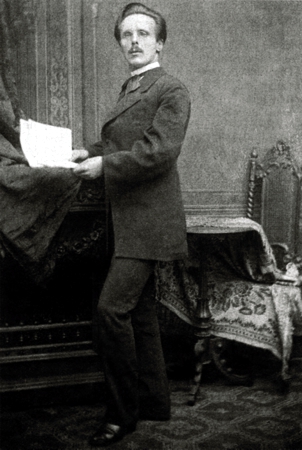 As from the beginning of September 1875 Karl May lives at Muenchmeyer's residence. Minna Ey, sister of Pauline Münchmeyer, takes care of May's private quarters. She should become May's fiance; however the up and coming succesful author shows not the least interest. 23rd February: House search at H. G. Münchmeyer. The Police investigate because of unauthorized selling of the ›Venustempel‹ and the Buch der Liebe. 2nd May: With this day finishes May's two years of Police supervision. At the beginning of August May cancelled continuation of a novel ›Fürst und Junker‹, written by Friedrich Axmann: To the readers of »deutschen Familienblattes«, who wish to acquaint themselves with the later fate of Dietrich von Quitzow until his death, the news should not come unwelcome, because the author of this topic will start on the contrary an even more fascinating and equaly moving novel: »Dietrichs von Quitzow last Journeys«, which will appear in Number 20 of the current »Feierstunden am häuslichen Heerde«, one in the Münchmeyer Publishing Firm appearing literary magazine. [Deutsches Familienblatt, No.49, p.770] The announced Quitzow-novel started however already in No. 10 of the Feierstunden under the author's name ›Karl May‹. In summer May is charged with cooperation on the Buch der Liebe. Further charged are Münchmeyer's brother Friedrich as publisher, later also Otto Freitag as editor of the ›Venustempel‹. In this situation Pauline Münchmeyer pushes for marriage with Minna Ey. May was found not guilty; presumably he made in his Buch der Liebe the deplorable places milder. At the end of October May leaves his position but still writes some »necessary manuscripts«. Supposedly at first he wants his Quitzow-novel to continue, even if he no longer is an editor with Münchmeyer. The hostility of Pauline because of May's rejection of her sister, which he could not tolerate, makes these plans impossible. Both May's Quitzow as well as Axmann's ›Kurfürst‹ (Axmann died since he left Münchmeyer) will be continued from March 1877 by Dr. Heinrich Goldmann. After his editor's time May moves for a time into Hohenstein and Ernstthal. There he falls in love with the attractive Emma Pollmer, who celebrates on the 22nd November her twentiest birthday. In the year passed May authored amongst other: Auf den Nußbäumen, Unter den Werben, Leilet, Der beiden Quitzows letzte Fahrten, Ausgeräuchert and Im Wollteufel. |
Dresden-Altstadt, Jagdweg 14 Pillnitzer Straße 72 |
| 1877 | May lives in
Pillnitzer St. 72 at widow Groh. During the next months he writes Die
beiden Nachtwächter, Der Dukatenhof, Die
verhängnißvolle Neujahrsnacht, Ziege oder Bock, Der
Samiel, Der Kaiserbauer. On the 26th May Emma Pollmer follows him to Dresden. She finds a position in the household of priest-widow Auguste Petzold in Mathildenstrasse 18. Karl May becomes an editor with the publisher Bruno Radelli for the 2nd year's edition of a popular magazine ›Frohe Stunden‹; the first number appears at the end of June. From No. 10 May publishes regularly his own texts: Der Oelprinz, Die Gum, Ein Abenteuer auf Ceylon, Die Kriegskasse, Aqua benedetta, Auf der [hoher] See gefangen, Ein Self-man. At Peter Rosegger appears Die Rose von Kahira. This story was already published at Münchmeyer the year before under the title Leilet. Because of the latest publication Rosseger considers »Mr. Karl May … to be a widely traveled man, who must have lived in the Orient for a long time.« |
Dresden-Altstadt, Pillnitzer Straße 72 |
| 1878 | On the 9th January
May is sentenced by the court in Stollberg for »unauthorized
practice of a public office« (in the meaning of paragraph 132 StGB
[German Law]) to three weeks of prison. This sentence is, as the
lawyer Erich Schwinge doubtlessly proved, an incorrect decision. The
acts are preserved. May had in no way undertaken any official
business. Protest (12th May) and clemency request (2nd July) were
rejected. From 1st till 22nd September Karl May had to »sit out« his
›penalty‹ in the jailhouse of the court office in Hohenstein. This
disgrace has never stopped being painful to him, as many examples in
his work testify. The relationship with Emma Pollmer became endangered due to her unfaithfulness; Karl May stayed presumably with his parents. His literary activity was shaping more luckily. First contacts with the catholic weekly ›Deutscher Hausschatz‹ in Regensburg. In the travel story Unter Würgern comes for the first time the name ›Old Shatterhand‹. End of November appears in Stuttgart publishing house Franz Neugebauer his book rework of the Ferry's novel ›Der Waldläufer‹, as well as his first book for the young readers Im fernen Westen. Further publications in this year: Ein Dichter, Der Giftheiner, Three carde monte, Unter Würgern, Der Girl-Robber, Der Boer van het Roer and the Stuttgart's newspaper novel Scepter und Hammer. From the included chapter Der tolle Prinz a serious break with Emma Pollmer could be concluded, whom May immortilized there as Emma Vollmer, who was unfaithful to her sweetheart. |
Dresden-Strießen Straße Nr. 4 Villa Forsthaus Ernstthal, Marktplatz 185 |
| 1879 | Am 9. Januar wird
May vom Gerichtsamt Stollberg wegen »unbefugter Ausübung eines
öffentliches Amtes« (im Sinne des § 132 StGB) zu drei Wochen
Gefängnis verurteilt. Dieses Urteil ist, wie der Strafrechtler Erich
Schwinge nachgewiesen hat, eine Fehlentscheidung. Die Akten sind
erhalten. May hat keineswegs eine Amtshandlung vorgenommen.
Einspruch (12. Mai) und Gnadengesuch (2. Juli) werden abgewiesen.
Vom 1.–22. September muss Karl May seine Strafe im Arresthaus des
Gerichtsamtes Hohenstein absitzen. Diese Blamage hat er nie
verwunden, wie zahlreiche Werkspiegelungen belegen. Die Beziehung mit Emma Pollmer ist aufgrund ihrer Untreue gefährdet; Karl May lebt vermutlich ständig bei seinen Eltern. Erfreulicher gestaltet sich seine literarische Tätigkeit. Erste Kontakte zur katholischen Wochenzeitschrift ›Deutscher Hausschatz‹ in Regensburg. In der Reiseerzählung Unter Würgern fällt dort zum ersten Mal der Name ›Old Shatterhand‹. Ende November erscheint beim Stuttgarter Verlag Franz Neugebauer seine Buchbearbeitung des Ferry-Romans ›Der Waldläufer‹ sowie sein erstes Jugendbuch Im fernen Westen. Weitere Publikationen in diesem Jahr: Ein Dichter, Der Giftheiner, Three carde monte, Unter Würgern, Der Girl-Robber, Der Boer van het Roer und der Stuttgarter Zeitschriftenroman Scepter und Hammer. Das darin enthaltene Kapitel Der tolle Prinz lässt auf ein ernstes Zerwürfnis mit Emma Pollmer schließen, die May dort als Emma Vollmer verewigte, welche ihren Geliebten betrügt. |
Ernstthal, Marktplatz 185 |
| 1880 | January: »May, Dr.
Karl …« is mentioned for the first time in ›Allgemeinen Deutschen
Literaturkalender‹. 19th February: The intended marriage announcement of Karl May and Emma Pollmer was made public in Hohenstein. The notice was in place from 20th February until 7th March. May: The ›Deutsche Hausschatz‹ reports for the first time, that the ›I narrator‹ of the travel adventures is identical with the author Karl May – he experienced all himself. 26th May: Emma's grandfather Christian Gotthilf Pollmer dies after a stroke in Hohenstein. And on the 27th May dies May's older sister Auguste Wilhelmine, married Hoppe, of blood disorder. Because of these fatal blows – probably also because of differences in opinions – the official marriage of Karl May and Emma Pollmer does not take place until the 17th August. 12th September: Church wedding in the Hohenstein church of St. Christopheri, followed by moving into a house ›Am Markt 2‹. Publications worth mentioning from this year: Deadly Dust, Der Brodnik, Die Juweleninsel, Der Kiang-lu, Tui Fanua. |
Ernstthal, Marktplatz 185 Hohenstein Am Markt 2 |
| 1881 | January: In the
Hausschatz – the travel story Giölgeda padishanün – later
the Durch die Wüste and volumes to follow – appears for the
the first time in a personal form [I narrator] Kara Ben Nemsi and
his servant Hadschi Halef Omar. This Orient cycle is literary only
surpassed by his late years works. March: The ›Deutsche Hausschatz‹ writes in No. 9 an answer to a reader in Westfalen: »The author of the adventure travel stories visited himself all the countries which are the scenes of his narratives. He returned recently from a journey to Russia, Bulgaria, Constantinopel etc., and even suffered a knife wound as a souvenir. He however does not enjoy to travel with the red Bädecker [travel guidebook] in hand and via railway compartment, but seeks the less known routes. – Many thanks for your greetings!« November 1881: The newspaper ›Le Monde‹ starts to print French translation of May's books. |
Hohenstein, Am Markt 2 |
| 1882 | May works
intensively on his Orient cycle for ›Deutscher Hausschatz‹. The
Reise-Abenteuer in Kurdistan as well as Die Todeskaravane
make him very succesful. The final chapters of his Juweleninsel for
the Stuttgarter publisher Goeltz & Ruehling he writes without
enthusiasm; the novel finishes accordingly. In late summer Karl and Emma May spend time on a holiday tour in Dresden-Altstadt. In Renger's restaurant it comes to a predestined meeting with an old acquaintance the publisher Heirich Münchmeyer. From this meeting develops a several years lasting business relation. A contract is cofirmed with handshake. May should write a gripping serial novel for a remunaration of 35 Marks per delivery. As soon as the edition reaches 20.000 prints, May should in addition receive a nice gratification, and further the ownership's rights. May starts at first sporadicaly with the Waldröschen: »Dear Madam! I shall be very thankful to you, if you could induce your dear husband, whom I have the honour to call my trusted friend, to send to me the manuscript, to be precise 3 numbers per week. Now is the best time to publish the small work. I have the first number ready, yet I cannot publish it as I cannot deliver more without a manuscript. I have done well for your husband. I have given him about 500 Marks already for this little work, and he is so ungrateful and lets me just sit and yet he calls himself my best friend in his letters and promises me pies in the sky, does not however keep a word of his promises. I believe he listens to you, because he loves you, as he always claims. I turn therefore with confidence to you and think of you as my saviour angel, who should redeem me from my expensive and highly dangerous situation. My wife sends her cordial greetings and is asking together with me for your help. I send my very cordial greetings, and sign myself with familiar respect, Your sincerest H.G.Münchmeyer Dresden the 20 October 1882.« Emma's mediation is succesfull: Waldröschen oder die Rächerjagd rund um die Erde started at the begining of December under the pseudonym »Capitain Ramon Diaz de la Escosura« and became shortly a bestseller. Further works: Der Krumir, Ein Fürst-Marschall als Bäcker, Robert Surcouf, Christi Blut und Gerechtigkeit, In Damaskus und Baalbeck, Ein Oelbrand. |
Hohenstein, Am Markt 2 |
| 1883 | With fair confidence
May travels at the beginning of February in Dresden to visit
Münchmeyer. Emma follows later. Between her and the publisher's wife
Pauline develops an intimate frienship. 6th April: Emma May's friend from youth Ida Metzer holds in her Hohenstein's flat a seance. 7th April: Moving from Hohenstein to Blasewitz. In the Blasewitz local resident's list May is recorded as »Literat und Redacteur«. Most probably the »Redacteur« is editing together with Münchmeyer the ›Deutsche Wanderer‹. It should be of the same quality as both the by me founded in 1875 popular magazines. In the ›Wanderer‹ appears at the end of September, now for the fee of 50 Marks, Die Liebe des Ulanen. May authored in this productive year further: Stambul, Im »wilden Westen« Nordamerika's, Der Amsenhändler, Pandur und Grenadier. He has to decline a cooperation with Joseph Kürschner (Publisher of Literary Calender) for lack of time. |
Hohenstein, Am Markt 2 Blasewitz, Sommerstr. 7 |
| 1884 | Presumably at the
beginning of April May moves with his wife Emma in Prinzenstrasse 4.
With the end of Waldröschen he starts in August another
popular novel for Münchmeyer: Der verlorne Sohn oder der Fürst
des Elends. The work for the ›Deutscher Hausschatz‹ gets on
hold. Der letzte Ritt, part of the Orient cycle, is from
middle of December interrupted for half a year; the readers and the
editor's board are annoyed. |
Blasewitz, Sommerstr. 7 Dresden-Altstadt, Prinzenstr. 4 |
| 1885 | 15th April: May's
mother dies from a tumour, presumably a cancer. About a month later
May's father suffers a stroke. Delivery of manuscripts is out during
these misfortune blows. Die Liebe des Ulanen stays for four
weeks without a continuation. As a makeshift solution appear parts
of the des verlornen Sohn under the title Ulane und
Zouave as a fragment in the ›Deutsche Wanderer‹. In June May's
psyche has recovered so far that he is able to carry on writing; he
even continues in summer for a few months his Orient cycle. His Ulanen-novel
finishes in October. At X-mas starts his fourth Münchmeyer novel Deutsche
Herzen, deutsche Helden. |
Dresden-Altstadt, Prinzenstr. 4 |
| 1886 | 27th February: May's
former Prison Institution catholic teacher Kochta dies. Towards the end of July finishes May's verlorner Sohn. In order to publish immediately a follow up novel, about the middle of June about 50 manuscript pages of the novel Delila came into existence. Almost at the same time died under mysterious circumstances on the 13th June King Ludwig II. of Bavaria – for a popular novels publisher sensational news. May interrupts therefore Delila (a fragment remains) and writes a novel about the fairy tale king: Der Weg zum Glück. This should be his last Münchmeyer novel. At the end of the year he begins a novel for young readers Der Sohn des Bärenjägers for the Stuttgarter publisher Spemann. |
Dresden-Altstadt, Prinzenstr. 4 |
| 1887 | 8th January:
The boys-magazine ›Der Gute Kamerad‹ starts with May's Sohn des
Bärenjägers. Meanwhile Münchmeyer has problems to print his
issues on time: »My dear doctor! I expected you on Sunday evening with a big load of manuscripts, but in vain. It upset me and made me worried as for me it is a question of my existence. If you do not deliver enough and on time I will loose my with difficulties subscribed readers which costs much money. Engage a stenographer! If you dictate through one night, you have 4 – 5 numbers of a manuscript on paper and that will help me. I have fulfilled almost every wish to you and beg therefore now you to fulfill my wish. Please bring me luck tomorrow morning because then with those already here will make circa 66 issues. My greetings, sincerely H. G. Münchmeyer Dresden 21st November 1887.« About beginning of April: Moving to Schnorrstrasse 31. Middle August May starts to write Durch das Land der Skipetaren; this travel story represents the end of the Orient cycle in ›Deutscher Hausschatz‹. |
Dresden-Altstadt, Prinzenstr. 4 Schnorrstr. 31 |
| 1888 | Beginning of January
finishes the Münchmeyer novel Deutsche Herzen, deutsche Helden.
May does not allow himself rest – he writes a story for young
readers Der Geist der Llano estakada. In the middle of
January the ›Hausschatz‹ starts to print the Skipetaren-travel
story. Beginning February starts Der Geist der Llano … in
›Guten Kameraden‹. On the 6th September dies after a long illness May's father. Change of editor's board at ›Deutscher Hausschatz‹ in Regensburg: The towards May positively disposed Venanz Müller is followed by Heinrich Keiter – a selfadmiring personality with his own writer's ambitions: »The battle about the novels of travel narrator Carl May is being hotly pursued by our readers. Whilst one part complains to the editors with severe criticism that the novels take such a large space which could be used more usefuly, the others in no less certain terms say that right at the beginning of the new year's edition a story by Carl May should start again. The editors are then forced to go the middle golden way to satisfy both sides.« 1st October: Moving from Dresden to Kötzschenbroda into a Villa Idylle, Schützenstrasse 6. 12th October: May enters his name into the local resident's list as »Dr. phil. Karl May, writer«. Further publications in this year: Kong-Kheou, das Ehrenwort, and also Der Scout. |
Dresden-Altstadt, Schnorrstr. 31 Kötzschenbroda, Schützenstr. 6 Villa Idylle |
| 1889 | Presumably early in
spring Karl and Emma May get to know the married pair Plöhn. Richard
Plöhn, the owner of a bandages manufacturing factory becames May's
best friend, and Plöhn's wife Klara – in the following years Emma's
best friend – will play an important role in May's life. Karl May
authored in this work-productive year about 3770 manuscript pages! Publications: Die Sklavenkarawane, Im Mistake-Cannon, Sklavenrache, Lopez Jordan. |
Kötzschenbroda, Schützenstr. 6 Villa Idylle |
| 1890 | 14th January: May's
landslady charged him in local court in Dresden for non-payment of
rent. The outstanding quaterly rent (200 Marks) for the expensive
Villa Idylle stays unpaid despite May's intensive writing. His
household servant girl had to be dismissed on the 19th March. Presumably at the beginning of April: moving to Niederlößnitz, Lößnitzstrasse 11. Important publications: Christus oder Muhammed, Der Schatz im Silbersee, Der Schatz der Inkas. At the end of October appears in book edition Der Sohn des Bärenjägers, according to the title page Die Helden des Westens (included into the volume is Der Geist des Llano estakado), at the Stuttgart ›Union Deutsche Verlagsanstalt‹. |
Niederlößnitz, Lößnitzstr. 11 |
| 1891 | 8th April: Moving to
Oberlößnitz into Villa Agnes, Nizzastrasse 13. 28th May: »… the wife of Dr.May woke up because of ground floor noise. She woke up her husband, who went immediately down where he found to his surprise …. all the cupboards and drawers open and the content partly strewn on the floor. The intruder also left an axe on the bed. There was no trace of the thief himself who forced his way into the room by bursting open a window shutter and breaking several window panes …«. [Kötzschenbrodaer Zeitung from 30th May] In late summer negotiated the publisher Friedrich Ernst Fehsenfeld from Freiburg im Breisgau with May about the publishing of ›Hausschatz‹ stories in a book edition. A historical moment. In loveable, nice Lößnitzgrund
there sit two in solitude; they enter into friendshipbond, never part their ways again. One sends the novels in, The other has them printed And the end is a happy note; Both will be mightily lucky! [Karl May to Friedrich Ernst Fehsenfeld] November: Karl and Emma May take into their home the nine-year old niece Clara (›Lottel‹) Selbmann. Important publications in newspapers: Das Vermächtnis des Inka (Kamerad), Der Mahdi (Hausschatz). |
Niederlößnitz, Lößnitzstr. 11 Oberlößnitz, Nizzastraße 1 d Villa Agnes |
| 1892 | 6th April: Publisher
H. G. Münchmeyer dies in Davos (Schweiz) from advanced lung disease. 10th May: The first volume from the Fehsenfeld edition Durch Wüste und Harem (In later editions Durch die Wüste) appears. Following are Durchs wilde Kurdistan, Von Bagdad nach Stambul, In den Schluchten des Balkan, Durch das Land der Skipetaren, Der Schut. Karl May becomes now a wealthy man. 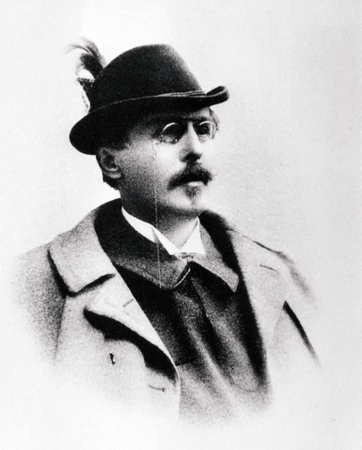 In summer Emma associates secretly with Army officers. May's niece Lottel tells all to her uncle. It comes to marital discord. Further life together of Emma and May's niece is not possible. In August Lottel is taken home by her mother, May's sister Karoline. From September the ›Hausschatz‹ starts with the 2nd part of Mahdi. At Union Publishers appears in October the book edition Kong-Kheu, das Ehrenwort under the title Der blau-rote Methusalem. |
Oberlößnitz, Nizzastraße 1 d Villa Agnes |
| 1893 | June: Karl and Emma
travel in Schwarzwald [Black Forest]. They take the opportunity to
visit publisher Fehsenfeld and his wife; together they go to
Switzerland into Bönigen am Brienzer See. On the 17th September May
writes to his publisher Fehsenfeld: Your anger is justified, however I am not that much at fault, as you think. The main reason that I cannot finish anything is my present as to the previous very much increased nervousness, to which my wife does not pay the slightest consideration, and then a more familiar, about which I cannot write. My wife became since the unfortunate trip completely different. … I am as the result of domestic quarrel now always so knocked down, that I often look at the wall over my writing desk, where a loaded revolver hangs. One needs after all peace, one way or the other! On the 26th November May writes to Fehsenfeld that because of his eye afliction he was »shortly twice in Leipzig». Book editions at Fehsenfeld: Winnetou der Rote Gentleman (3 volumes, the postscript: »der Rote Gentleman« was later omitted), Orangen und Datteln. Important newspaper publications: Der Oelprinz, Die Felsenburg (later Satan und Ischariot I). And one more book edition at the Union: Die Sklavenkarawane. |
Oberlößnitz, Nizzastraße 1 d Villa Agnes |
| 1894 | March: May suffers
from influenza with inflammation of the rip cartilages. Also his
eyes make him worried. Beginning of May he travels with Emma for
rest into Harz. His state of health is not good; because of that he
has to use the services of a secretary. (May in a letter to
Fehsenfeld from 9th May). Presumably in summer May writes about himself as ›Old Shatterhand‹ the following part for Old Surehand I: I was born as a sick, weak child, who still at the age of six years crawled on the ground, not being able to stand or run … I was blind three times … [S. 41f.] This is most probably a small poetic exaggeration, but behind this could be hidden May's fear from new blidness. From September appears in ›Deutsche Hausschatz‹ Krüger Bei (later Satan und Ischariot II); there the readers at X-mas learn about Winnetou's visit at the Dresden's choir! A 440 manuscript pages containing a chapter In der Heimath is crossed out by Heinrich Keiter. October: In the house of Münchmeyer's widow May asks for the long outstanding settlement of his five Münchmeyer's novels. Later he receives a set of bound volumes of the published novels. The original manuscripts of the Münchmeyer's novels are no longer in existence, they were destroyed as superfluous. 27th November: Pauline Münchmeyer pleads for a new novel, if possible the Delila (1886) should be continued. May refuses! Fehsenfeld book editions: Am Stillen Ocean, Am Rio de la Plata, In den Cordilleren, Old Surehand I. Further book editions: Die Rose von Kairwan (Wehberg, Osnabrück), Der Schatz im Silbersee (Union). |
Oberlößnitz, Nizzastraße 1 d Villa Agnes |
| 1895 | This year the in
Lawrence/USA living Ferdinand Pfefferkorn visits with his wife the
former schoolfriend Karl May.The Pfefferkorns are dedicated
spiritualists. Seances are held at May's house, at which most
probably were present the befriended pair Plöhn's. 23 December: Bought a new Villa! [for 37.300 mark] Yesterday moved in with new furniture! Day and night to write manuscripts! [May to Carl Felber] 3oth December: The official sales contract for the Villa »Shatterhand.« in Radebeul, Kirchstrasse 5, (today Karl-May-Straße) is signed. Book editions: Old Surehand II (Fehsenfeld), Das Vermächtnis des Inka (Union). 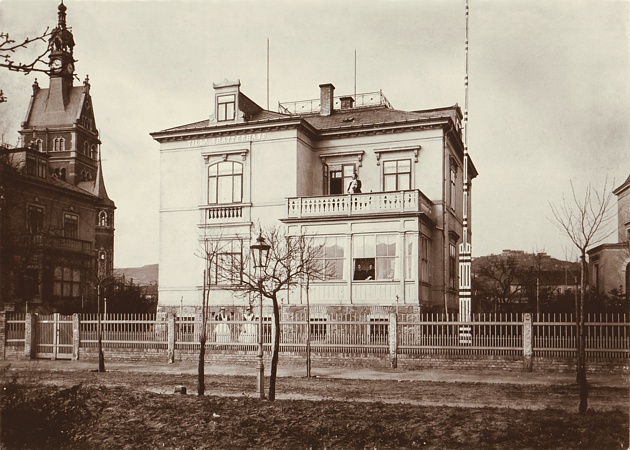 |
Oberlößnitz, Nizzastraße 1 d Villa Agnes Radebeul, Kirchstraße 5 Villa »Shatterhand.« Heute Karl-May-Museum |
| 1896 | March/April: Karl
May takes possession of the ›Silberbüchse‹ [Silver rifle] and the
›Bärentöter‹ [Bear Killer] from Dresden gunsmith Max Fuchs made to
order. He will document with these the genuineness of his travels,
to forget at the same time his sad past. May could use publicity
exercise like a modern showstar.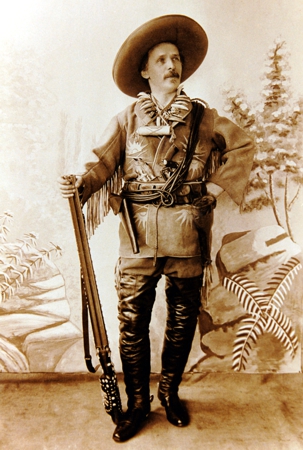
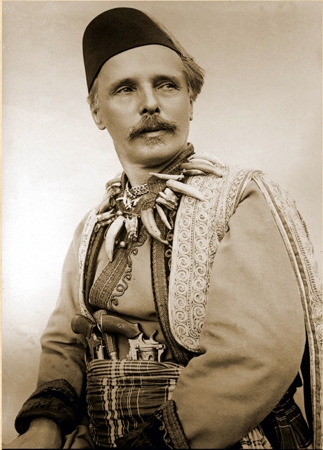 Easter: The amateur photographer Alois Schießer, who arrived from Linz, took 101 costume shots with Karl May as ›Old Shatterhand‹ and ›Kara Ben Nemsi‹. The ›Old Shatterhand Legend‹ reaches its highest point; many Karl May Clubs are founded. In summer, presumably in July, Heinrich Keiter visits the succesful writer. He apologises personally for crossing out the Heimath chapter in Krüger Bei. May declared previously that he will not supply the ›Deutscher Hausschatz‹. At the end of September appears in ›Hausschatz‹ May's Freuden und Leiden eines Vielgelesenen: The night, often two, three nights one after the other, without then being able to sleep during the day, is in general my working time, because of the many visitors, coming daily, to personally get to know »their« Old Shatterhand resp. Kara Ben Nemsi Effendi. 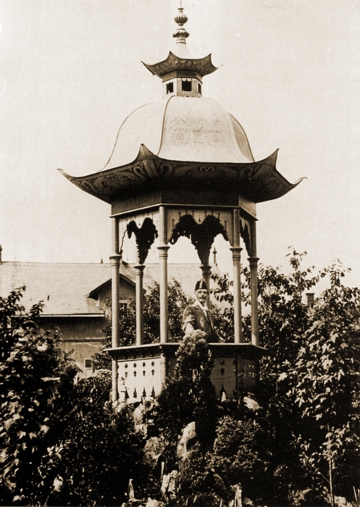 In ›Guten Kameraden‹ is from September published May's last novel for young people Der schwarze Mustang. Book editions at Fehsenfeld: Der Mahdi (3 volumes), Old Surehand III, Satan und Ischariot I–III. |
Radebeul, Kirchstraße 5 Villa »Shatterhand.« |
| 1897 | 26th January:
»Herr Keiter, who will in the future abstain from any literary
interference in your manuscripts, begins in the 8th issue of
›Hausschatz‹ with your new and so keenly expected travel story ›Im
Reiche des silbernen Löwen‹ … Hopefuly you will please us soon with
a continuation of the most interesting manuscripts.« [Friedrich
Pustet jun. to Karl May] Presumably in early spring May composed music to Ave Maria of Winnetou's dying wish. From May until July Karl und Emma travel through Germany and Austria. Places they visit are: Leipzig, Hamburg, Deidesheim (they pay a visit there to the family of befriended wine merchant Seyler), Stuttgart, Bodensee, Innsbruck, Achensee, Munich, Regensburg, Böhmen. The stay in Munich turned out to be the highlight of the publicity tour: On the first day over 900 visitors, second day over 600, third again 800. Towards the evening I went out through the side door and ran away. The high school students who were after an autogram stood in such great numbers before the hotel, that the tramway could not get through and they had to be sprayed away with a water hose. It's a fact! [Letter to Fehsenfeld from 27th July] Book editions: Auf fremden Pfaden, Weihnacht (Fehsenfeld) Der Oelprinz (Union). |
Radebeul, Kirchstraße 5 Villa »Shatterhand.« |
| 1898 | 22 February: Her
Imperial Highness Archduchess Maria Therese gives an audience to
Karl May. 6th May: In Gartow (Lower Saxony) May was seized by two Policemen; he is not to leave his hotel room. He is considered to be a swindler, because he gives for smallest services rich tips. In the end news came from Radebeul: »Karl May domiciled here, likes to exercise charity.« On 30th August dies Heirich Keiter; Dr.Otto Denk takes over his editorial position at ›Deutsche Hausschatz‹. At this time it also comes to a nine years split with ›Wochenblatt‹; a catholic opposition against May comes into existence. Book editions at Fehsenfeld: Im Reiche des silbernen Löwen I–II. Further appear Ernste Klänge, a publication with both May's music compositions Ave Maria and Vergiß mich nicht! |
Radebeul, Kirchstraße 5 Villa »Shatterhand.« |
| 1899 | During the months
January till March May finishes his novel Am Jenseits; he finds
himself on the best way to fine literature. Do you read the
printer's proofs of Volume 25? Yes? Than you would have noticed,
that Karl May starts now to come out with his own intentions. It
is a question of well prepared, great movement from the religious
– social field … The volumes up to now were written only for one
purpose, to gather as many as possible readers as working field.
[May to Fehsenfeld, 13th March] 16th March: Pauline Münchmeyer sells the Publishing firm to Adalbert Fischer, who is interested in particular in May's popular literature novels. 26th March: Departure for Orient. Importen visited places: Genua (4th April – farewell from Emma and the Plöhn's couple because of health reasons), Port Said (9th April), Cairo (30th April – May hires there little later the Arab servant Sejd Hassan), Beirut (26th June), Haifa (18th July), Jerusalem (30th July), Jaffa (21st August – 2nd September), Aden/South Arabia (15th September). Many liked me on the ship [›Gera‹] even if I am just now the opposite from the previous Karl. He was with a great ceremony drown by me in the Red See, with ship's coal, which took him right to the bottom … [Letter to Plöhn's from 16th September]. 10th November: Arrival in Padang on Sumatra. May suffers from emotinal outbursts, refuses all nourishment and should have acted insane – it is possible he suffered from dysentery. Nothing is known for sure. This state lasts for about a week. 22nd November: May sends a telegram from Padang to Radebeul; he asks Emma to come with the Plöhns to Port Said. 11th Dezember: May is quarantined because of danger of diseases and suspicion of plague. On the 18th December he is allowed to leave Port Said. His friend Richard Plöhn, who suffers from Bright's kidney disease, becomes in the meanwile seriously ill and stays with Klara and Emma in Arenzano (20 km west of Genoa). In Germany in the meantime began fierce press attacks against May; in particular Dr. Fedor Mamroth (Frankfurter Zeitung) and Hermann Cardauns (Koelnische Volkszeitung) criticised May's selfpromotion and the connected with it Old Shatterhand legend. The argument, started somewhat objectively at first, became in following years polemic, upright malicious: a witch hunt to death begins. Book edition: Am Jenseits (Fehsenfeld), Der schwarze Mustang (Union). |
Radebeul, Kirchstraße 5 Villa »Shatterhand.« |
| 1900 | Karl and Emma May as
well as Richard and Klara Plöhn stay in Arenzano until the 14th
March; then the journey takes them to Pisa, Rome, Naples, Port Said.
Cairo, Gizeh, Jaffa, Jerusalem, Hebron, Jericho, Tiberias, Nazareth,
Haifa, Lebanon, Baalbek, Damascus amd Cyprus.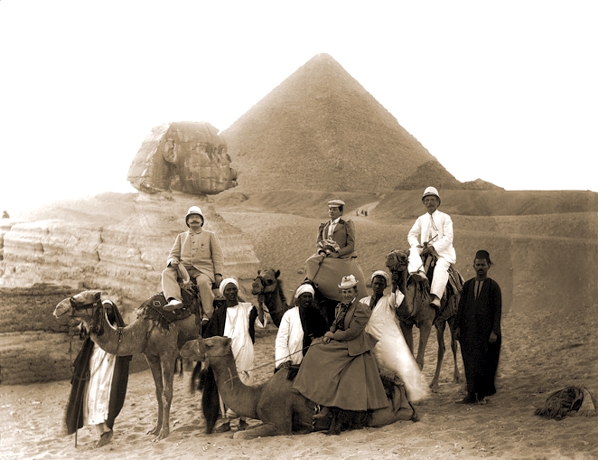 In Instanbul May suffered again from emotional outbursts. Klara Plöhn was worried that »one would have to take him into a mental institution«! May's later wife certainly possessed a flair for colorful description of events and might have here a little exaggerated. The conclusion of the trip was: Coprinth, Bologna, Athens, Corfu, Venice and Bozen. 25th March: The Münchmeyer's successor Adalbert Fischer disregards May's author's right and puts a new edition of Die Liebe des Ulanen on the market.The other four Muenchmeyr's novels should follow shortly, partly reworked by writer Paul Staberow. 17th June: May says tearful goodby to his servant Sejd Hassan. 31st July: Arrival in Radebeul after 15 months of absence. Karl May became a new person – the Old Shatterhand legend is dead. Only love of humanity and reconciliation of nations are from now his great ideals; also in private life he is restrained: the sexuality of Emma is not capable to have an hold on him. All my writings so far are just an introduction, only preparation. What I really want, no person knows except myself … only now I start my proper task … [May's letter to his publiher Fehsenfeld from 10th September] In time for X-mas festivities appears May's volume of poems Himmelsgedanken. |
Radebeul, Kirchstraße 5 Villa »Shatterhand.« |
| 1901 | 14th February: May's
friend Richard Plöhn dies of renal disease. His wife Klara is
shattered; she is now a permanent guest in the Villa
»Shatterhand.« For Joseph Kürschner May writes his pacifist novel Et in terra pax. With that May undermines the imperialistic tendency – the hurrah-patriotism of the collected work ›China‹ in which his text appears. End of September May travels with Emma and Klara in Switzerland to Vierwaldstaetter See. In autum he writes as an answer to polemic press attacks an anonymous pamphlet »Karl May als Erzieher« and »Die Wahrheit über Karl May«. 10th December May is sueing Adalbert Fischer for unauthorized reprint of his Münchmeyer novels. |
Radebeul, Kirchstraße 5 Villa »Shatterhand.« |
| 1902 | At the beginning of
the year the editor from Cologne Hermann Cardauns holds several
anti-May lectures, in which he describes May's Münchmeyer novels as
»abysmally immoral«. 10th March: Karl May takes to court Pauline Münchmeyer, against the will of his wife Emma who is her intimate friend. On the 16th March May engaged barrister Rudolf Bernstein to ask the accused Pauline Münchmeyer for the following:
19th August: Emma May signs divorce papers. 10th September: May lodges in Radebeul the divorce documents. Fehsenfeld's book edition: Im Reiche des silbernen Löwen III. |
Radebeul, Kirchstraße 5 Villa »Shatterhand.« |
| 1903 | 14th January: May's
marriage was dissolved. 4th March: The divorce became legally valid. 30th March: Wedding of Karl May and Klara Plöhn at registrar's office. A day later follows a church wedding in the Lutheran church at Radebeul. 25th May: At Adalbert Fischer [Publisher] appears May's Erzgebirgische Dorfgeschichten. 3rd November: Emma receives from May a yearly income of 3000 Mark; for that she has to live at least 100 km away from Dresden – she moves to Weimar. Beginning November the Münchmeyer's lawyer Dr. Gerlach succeds in bringing in May's criminal records. The result comes on 8th November. May becomes seriously ill: High fever with heart weakness. Fehsenfeld's book edition: Im Reiche des silbernen Löwen IV. |
Radebeul, Kirchstraße 5 Villa »Shatterhand.« |
| 1904 | 8th March: Karl and
Klara May visit in Meißen the artist painter Sascha Schneider. He
should provide the whole Fehsenfeld's edition with different title
pages, to stress in particular the artistic, pacifist values of his
writings – a clear turn away from the so called ›Author for young
people‹.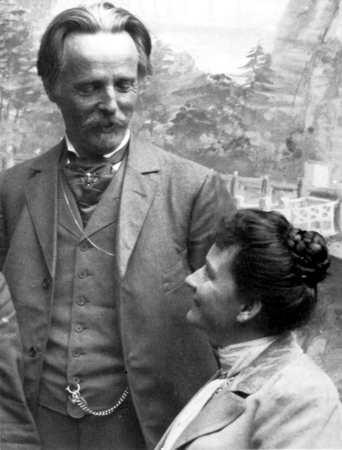 Middle of September appears Et in terra pax in Fehnsenfeld's enlarged book edition under the title Und Friede auf Erden! 26th September: Pauline Münchmeyer is obliged to produce accounts, as soon as Karl May provides a sworn statement. X-mas: As a revenge for refused loan, which the unscrupulous press-bandid Rudolf Lebius sought to get from May, shout from the shopwindows of Dresden's bookshops big placards, on which is from far visible announcement in red huge letters: »The Previous Convictions of Karl May«. |
Radebeul, Kirchstraße 5 Villa »Shatterhand.« |
| 1905 | Early in the year
appears as a private print May's view on the [Münchmeyer's] affair Ein
Schundverlag. There he reports on his time with Heinrich
Münchmeyer. In 1909 will also appear as a private print Ein
Schundverlag und seine Helfershelfer. On the 3rd October is May's complaint of slander by Lebius dealt with before the Dresden' country court. Through a tactical mistake of May's lawyer Klotz, public reading from previous convictions record of Karl May was allowed. In the same month May visits in Dresden a lecture by the Nobel peace prize winner Bertha von Suttner, a friendship develops between them. |
Radebeul, Kirchstraße 5 Villa »Shatterhand.« |
| 1906 | 5th February: May
wins the Münchmeyer process in 2nd session. 30th June: Rudolf Lebius calls May a hereditary criminal. 1st September: May's drama Babel und Bibel. Arabische Fantasia in zwei Akten appears at Fehsenfeld in one edition of 1200 prints. |
Radebeul, Kirchstraße 5 Villa »Shatterhand.« |
| 1907 | 9th January: May
wins at the [German] Reich court in Leipzig the Münchmeyer process
in 3rd session. About the repayment of damages is yet to be decided.
May's legal representative Rudolf Netcke put a sum to the Waldröschen
alone to 250.000 Mark! On 11th Februar May gave the following sworn
statement: I swear in the name of the Omnipotent and Omniscient God 1. I have, after I accidently met in 1882 the deceased Heinrich Gotthold Münchmeyer in a restaurant in Dresden, promised to write a novel for him, namely the WALDRÖSCHEN under following conditions: The novel should appear under a pseudonym and should be printed and distributed only up to 20.000 prints. As compensation I should receive for every issue 35 mark and apart from that, when the authorized number of prints is reached, once more a fine gratification. Besides I should keep the right to include the novel into my collected works. 2. These stipulations were carried over later to the novels DEUTSCHE HERZEN UND HELDEN, DER VERLONERE SOHN und DER WEG ZUM GLÜCK, however with the stipulation that the remunaration for each print of the named novels will be not only 35, but 50 Mark. 3. With regard to the novel DIE LIEBE DES ULANEN I agreed in 1883 with Münchmeyer that I will allow him to print the novel only in the 1884 edition of »Deutscher Wanderer«. 4. The same has been agreed with Münchmeyer about six stories from 1875 and 1884 AUS DER MAPPE EINES VIELGEREISTEN (INN-NU-WOH and OLD FIREHAND), EIN STÜCKLEIN VOM ALTEN DESSAUER, DIE FASTNACHTSNARREN, UNTER WERBERN, DER GITANO and DIE POLIN [WANDA] that one print only in one particular year's edition is to be published. 5. I have not agreed with Münchmeyer in regard to 1 – 4 of my works that he after once only payment will get unrestricted publishing rights. In this help me God. 7th April: The Münchmeyer's successor Adalbert Fischer dies. On the 15th April 1907 reports the Münchmeyer's lawyer Dr. Gerlach May and his associates for perjury. The reproach is proven untenable. 8th October: Inheritors of the publisher Fischer declare in a settlement, »that the in the publishing house H. G. Münchmeyer printed novels of writer Karl May suffered over a period of time through insertions and changes by a third hand such changes, that in their present form cannot be considered any longer as to be authored by Karl May.« The author's name Karl May is taken away from the famously notorious five Münchmeyer's novels and can be from now on printed solely anonymously. Münchmeyer's succesor … has made such changes that between the old and his new edition a difference of hundreds of pages appeared. This is after all just horrible! If some person would dare to cut and paintbrush pictures of a painter or to hack and chisel statues of a sculptor and offer such mutilations for sale as originals, the whole Presscorp would take the cause of the injured artist and brand the falsificator in such way that he would not be able to show his face again. [Karl May: Ein Schundverlag, p. 852f.] 13th September: Meeting with the Hausschatz editor Otto Denk. After nine years May is ready to write again for the ›Deutscher Hausschatz‹. Immediately he starts with a draft for 'Mir von Dschinnistan. By this he makes a move into fine literature. With the readers of ›Hausschatz‹, who expected the old travel stories full of action as before, this novel finds little approval. At the end of the year May writes Frau Pollmer, eine psychologische Studie, in which he tries in vain to write himself free from his first wife. This text stays unprinted. Fom October appears in the Regensburg newspaper ›Efeuranken‹ the travel tale Schamah. |
Radebeul, Kirchstraße 5 Villa »Shatterhand.« |
| 1908 | 8th March: In his
last will May establishes a charitable foundation. 23rd March till 23rd April: In ›Grazer Volksblatt‹ appears Abdahn Effendi. The anthropologist and sexual researcher F. S. Krauss visits May and names him »a blessing for humanity«. In this year Karl May with his Klara undertake the first and only trip to America. The places visited: Bremen (5th September), New York (16th September), Albany (22/23rd September), Buffalo (end of September), Niagara Falls (beginning of October), Lawrence/Massachusetts at school friend Pfefferkorn (October), Boston and New York (November). 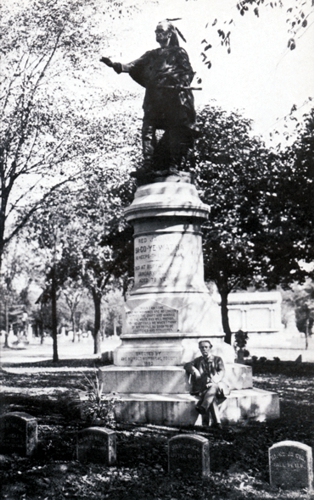 On 4th November Mays are presumably again in Radebeul. Beginning of December they stay for a short time in London. |
Radebeul, Kirchstraße 5 Villa »Shatterhand.« |
| 1909 | 31st July: May's Merhameh
appears in ›Eichsfelder Marienkalender 1910‹. September: Dr. Adof Droop publishes a study: »Karl May. An analysis of his travel stories«. 22nd November: Rudolf Lebius write to a friend of Emma the opera singer Selma vom Scheidt that he considers Karl May »to be a born criminal«. 17th December: Karl May lodges a complaint at the magistrate court Berlin-Charlottengurg against Lebius for slander. 8th December: May has a lecture in Augsburg Sitara, das Land der Menscheitsseele. Fehsenfeld book editions: Ardistan und Dschinnistan I and II. |
Radebeul, Kirchstraße 5 Villa »Shatterhand.« |
| 1910 | 10th January: Karl
May starts a legal prosecution against Rudolf Lebius for the worst
kind of slander because of his article »Hinter den Kulissen« [Behind
the Scene] published in the weekly magazine ›Der Bund‹ on 19th
Dcember 1909. Lebius claimed May had for years lived in a forest as
a chief robber, commited daily breakings, raids on market women,
sexualy misused his nine years old niece and strangled the
grandfather of his first wife Emma! May's frequent illnesses, made worse by the character assassinations, led in the end to the writer's death. Main court proceedings never eventuated. According to law experts Lebius would have been sentenced to jail term. On 12th April Lebius was found firstly not guilty with regard to slander action (complaint from 17 December 1909) in the letter to Selma vom Scheidt; May appealed. 12th May: I do not deny that I came into conflict with the law 40 or 50 years ago and was punished for it; but what I did then in the deepest mental depression and coerced state [of mind] would be in the present, more enlightened time heard not by a judge, but a physician. My opponents bring this up and put cunning lies to it. There are five legal proceedings underway from which the truth will come out. [May in a letter to Peter Rosegger] In August of 1910 Dr. E. A. Schmid was a guest for a few days at the »Villa Shatterhand.«. After May’s death, as a Director of the ›Karl-May-Verlag‹ [Publishing House], he widely and with great effort made generally known May’s views. Fehsenfeld book editions: Winnetou IV, Mein Leben und Streben. Almost simultaneously with May's autobiography Rudolf Lebius published »Die Zeugen Karl und Klara May«, – a pamphlet of the worst kind! Because of reciprocal objections both May's autobiography and also the Lebius pamphlet were banned. |
Radebeul, Kirchstraße 5 Villa »Shatterhand.« |
| 1911 | 8th May: Again
very sick, I write to you only very shortly. I have overestimated
my strength, lung inflammation and physical strain of wittness
proceedings made me completely kaputt … I must go to a spa, I
leave already on Thursday. [Karl May to lawyer Haubold]. 11th May: Departure in Joachimsthal. Dr. Gottlieb ordered bathing. From the middle of June till end of July Karl and Klara May spent in South Tirol on recreational holiday. On the Mendel his state of health becomes worse again. 18th December: In an appeal proceedings (complaint from 17th December 1909) Rudolf Lebius is found guilty of slander and given 100 Mark penalty to pay. |
Radebeul, Kirchstraße 5 Villa »Shatterhand.« |
| 1912 | 25th Februay:
May celebrates his seventies birthday. Beginning March May travels for the last time in Hohenstein-Ernstthal. He visits there his sister Wilhelmine Schöne; their niece Ilse receives from him for the beginning of school a large cone full of lollies. 22nd March: Karl May delivers a lecture in Vienna at the invitation of »Akademischen Verbandes für Literatur und Musik« in front of over 2000 listeners, his big peace address is entitled Empor ins Reich der Edelmenschen. Amongst the present is Bertha von Suttner. 30th March: Karl May dies around 8 PM in his Villa »Shatterhand.« His breathing stopped, presumably as a result of lung disease. The big heart became still. May's funeral follows on 3rd April at Radebeul's cemetery. 
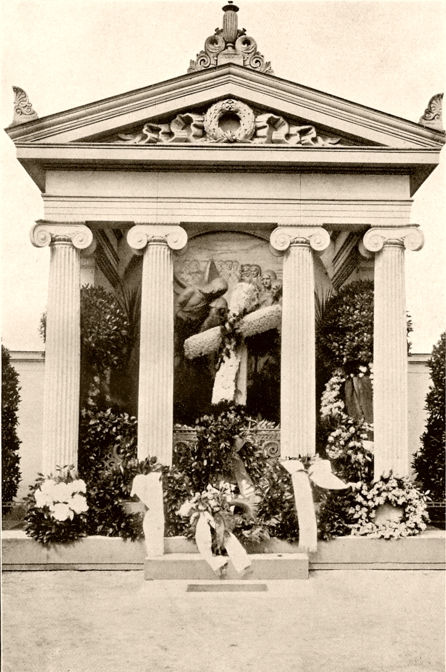 |
Radebeul, Kirchstraße 5 Villa »Shatterhand.« |
Author: Ralf Harder